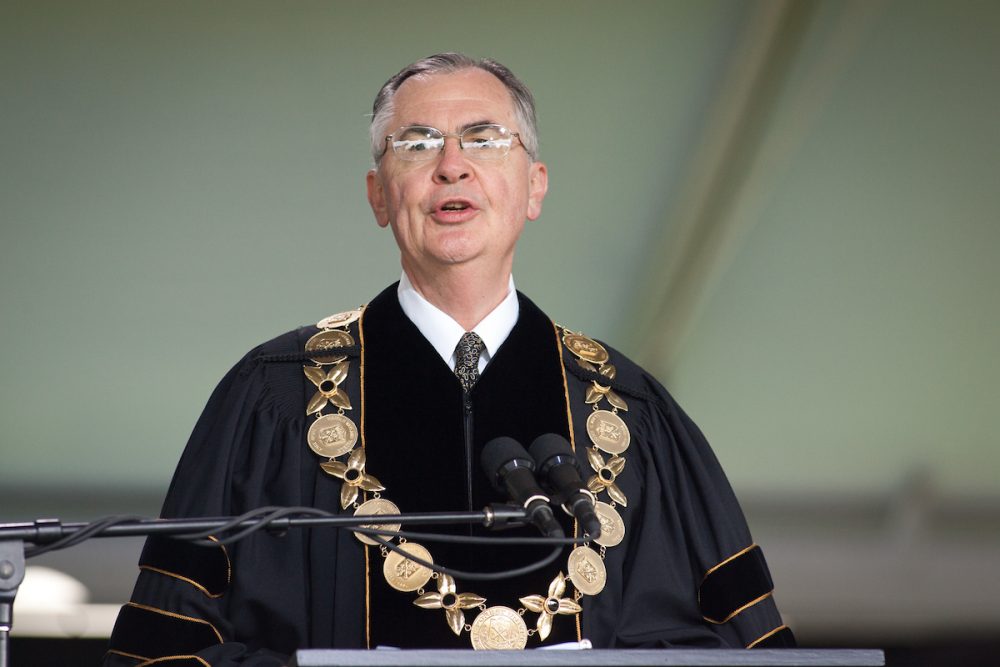2011: President Hatch
A Life of Learning

Wake Forest Commencement Service
By Nathan O. Hatch
May 16th, 2011
Class of 2011, this morning I have a simple message: take advantage of the new freedom that is yours: to study and explore. With a Wake Forest degree in hand, you do not have to read any particular article or book. (Note that I choose my words carefully.) You will no longer face the tight regimen of papers, tests, and grades that has set your course in college. Your curiosity can now run its course and at its own pace.
I trust your education at Wake Forest offered one gift above all: to whet your appetite for understanding. The very reason a university exists—its heart and soul—is to inspire passion to learn, explore, discover, understand. In these walls, I trust you have been gripped by the power of a great novel, or dazzled by hundreds of billions of galaxies in the universe, or stirred by a play or concert, or amazed by a brilliant political scientist or financial analyst. Most of all, I hope that you understand yourself better: your talents, your passions, your deepest concerns and convictions.
Professor Nancy Hopkins, who teaches at MIT, remembers her own moment of awakening in college. She does so in frankly romantic terms, describing her “crush on DNA.” After hearing a lecture by James Watson on the wonder of DNA, she admits she suddenly fell in love with a subject that promised to unravel the very mysteries of life.
I hope that you have experienced such moments of awakening—and that their memory will be a continuing inspiration. “Never lose a holy curiosity,” advised Albert Einstein. Be relentlessly inquisitive, every day, about the world around, its promises and mysteries. While the connections between DNA and the mysteries of life are obvious, perhaps you have also learned here at Wake forest that virtually any subject to which you thoroughly dedicate yourself can unravel mysteries for you.
The best dividends of learning do not come to the shallow explorer, but to the one who devotes focused attention. We live in a culture that celebrates innovation and creativity but also distracts us from an intensity of focus. New York Times columnist Gail Collins put it this way: “I think it’s hard to be great without the ability to concentrate. The more distractions we’ve built into our culture, the harder it is to develop serious thinkers and planners. And over the last 50 years, our span of attention has collapsed to about that of a hyperactive gnat.” A life of learning requires focus.
Nothing encourages that concentration like a partner in the conversation. Your professors have been that kind of partner, and in many cases will continue in that role. But behind you today sit your families, and around you many lifelong friends – extraordinary sources of wisdom and perspective. Beyond those conversation partners you already know, my experience has proven to me over and over again that the growth of knowledge and the intensity of my interest in new knowledge is indirectly related to the similarities between me and those with whom I learn.
A life of learning also requires a willingness to challenge conventional thinking. Many pundits today come to quick conclusions and spend most of their energy elaborating and defending those positions. Our world is far too complex to be understood in sound bites, through Wikipedia moments, or by listening to talking heads that debate the predictable. Read both sides of important arguments. Compare the best minds in the world on a given topic of interest. Refuse easy answers. Compare the wisdom of the ages with contemporary fashion. Base your convictions on deep understanding.
To learn and keep on learning, Aristotle suggested, is near the essence of what it is to be human. In his eyes a quest to understand was integral to living pro humanitate – for the best of human flourishing. As you go forth from this place, I trust that you will accomplish much and that you will serve many. But let our lives of action and influence always be shaped by a quest, first, to understand.
Do everything in your power to fan the flame of curiosity for yourself and for others. Make it a habit—a lifelong passion—to learn. In the words of poet Mary Oliver: “Pay attention. Be astonished. Tell about it.”
- 2011: Main Story
- 2011: Speaker Indra K. Nooyi
- 2011: President Hatch
- 2011: Retiring faculty
- 2011: Senior Profiles
- 2011: Commencement Photos
- 2011: Video: Ceremony
- 2011: Video: Interviews
- 2011: Video: Time lapse
- 2011: Video: Commencement Slideshow
- 2011: Video: Baccalaureate
- 2011: Video: Baccalaureate Slideshow
- 2011 Baccalaureate Photos
- 2011: By the numbers
- 2011: Programs
